Marvel at the complex and captivating genealogy of Abraham in the Bible, a lineage shaping theological history and contemporary religious thought.
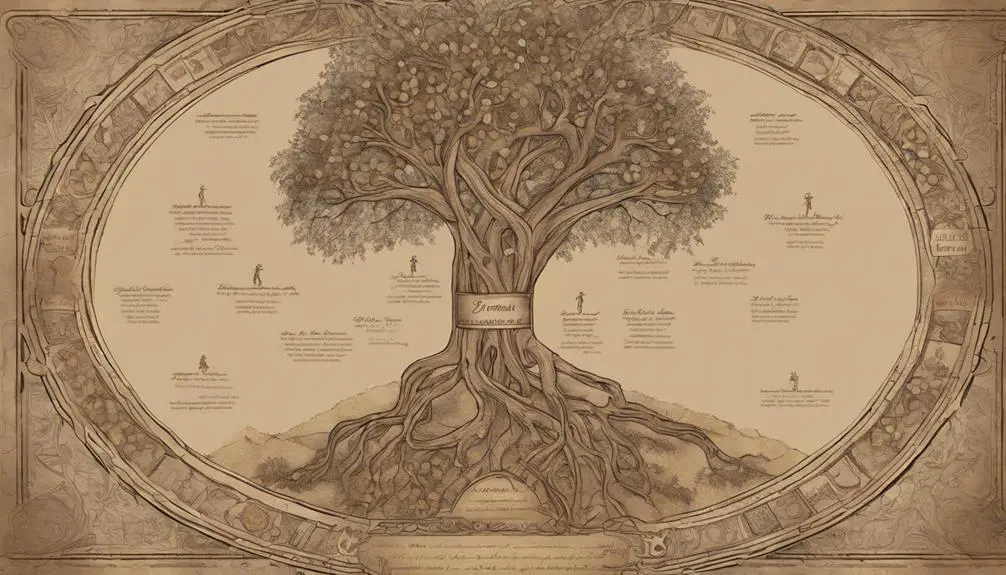
Genealogy of Abraham in the Bible
Did you know that Abraham, the patriarch of three major world religions, is traditionally believed to be the ninth generation descendant of Noah's son Shem, according to the Biblical genealogy?
You've likely heard of Abraham's famous son, Isaac, but what about his lesser-known descendants? There's a fascinating lineage that extends far beyond what's often taught in Sunday school.
It's intriguing how these bloodlines have shaped theological history and continue to impact religious thought today. You'll be surprised at the connections you can uncover in this intricate web of ancestry.
Key Takeaways
- Abraham, originating from ancient Mesopotamia, was chosen by God to establish a monotheistic lineage, shifting from his father's polytheistic beliefs.
- Abraham's sons, Isaac and Ishmael, born to Sarah and Hagar respectively, became ancestors of significant nations, fulfilling God's promise.
- Noteworthy figures in Abraham's lineage include his sons, grandsons, and wives, each playing pivotal roles in shaping biblical history and fulfilling divine promises.
- The descendants of Abraham made significant diplomatic and cultural contributions, establishing and preserving religious traditions, shaping civilizations, and leaving a lasting impact on history.
Origins of Abraham's Lineage
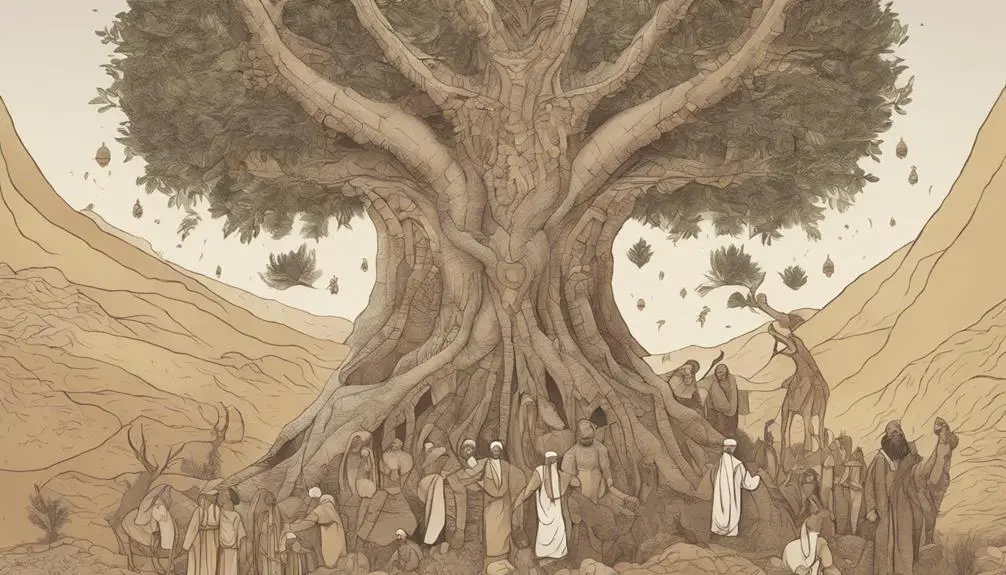
Delving into the origins of Abraham's lineage, you'll find a rich tapestry of biblical history and genealogy that starts with Terah, Abraham's father, in the city of Ur. Terah, a significant figure himself, had three sons – Abraham, Nahor, and Haran. It's important to note that Ur, where Abraham's ancestors hailed from, was a powerful Sumerian city-state in ancient Mesopotamia. The cultural context of Abraham's lineage is steeped in this Mesopotamian heritage, a cradle of civilization known for its advanced culture, legal codes, and religious practices.
As you dissect the early roots of Abraham's lineage, you'll discover that, despite Terah's polytheistic beliefs, Abraham was chosen by God to establish a monotheistic lineage. This pivotal shift from polytheism to monotheism forms a central aspect of Abraham's story. Abraham's ancestors, thus, embody a significant transformation in religious history, from a culture embedded in polytheistic worship to a lineage that would shape the foundations of monotheistic religions. Understanding this cultural context of Abraham's lineage is key to appreciating the profound shift that Abraham's life and faith represented in biblical history.
Abraham's Immediate Descendants
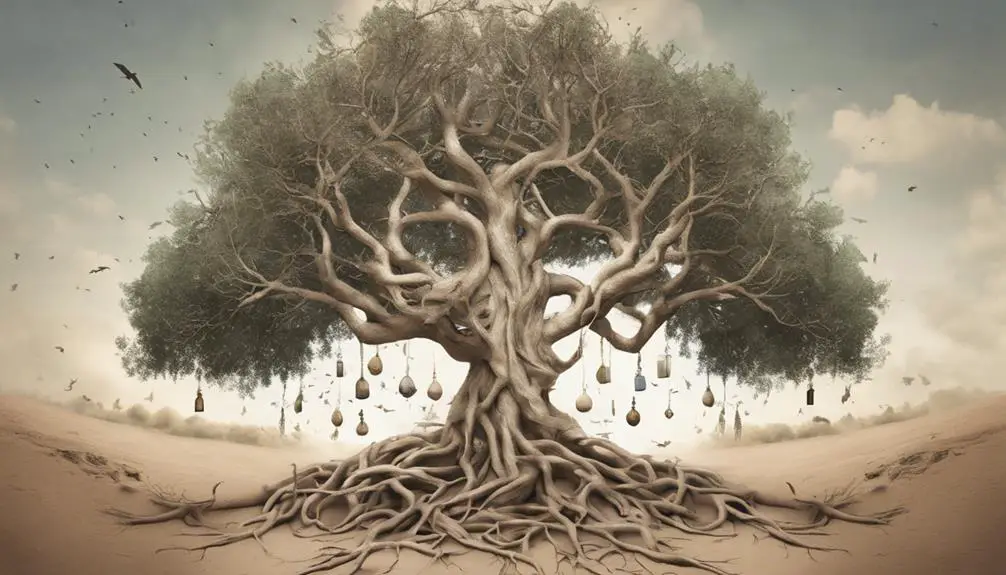
Moving on from Abraham's origins, it's crucial to explore his immediate descendants, starting with his sons Isaac and Ishmael, who play significant roles in shaping the biblical narrative. Both sons, born to different mothers, Sarah and Hagar respectively, not only share Abraham's bloodline but also embody the influence of Abraham's wives on their lives and destinies.
The impact of Abraham's wives' influence is prominent in the diverging paths taken by Isaac and Ishmael. Isaac, the son of Sarah, Abraham's legitimate wife, becomes the ancestor of the Israelite nation. He inherits Abraham's blessings and continues the covenant between God and Abraham's descendants.
On the other hand, Ishmael, son of Hagar, also carries a significant legacy. Although he's alienated due to his birth from a concubine, he's blessed by God to become the progenitor of a great nation. The Arab tribes, known to be his descendants, acknowledge him as their patriarch.
In analyzing Abraham's immediate descendants, one can't overlook the distinct roles played by Isaac and Ishmael, or the influence wielded by their mothers. Their stories reflect the complex dynamics of Abraham's family and their profound impact on biblical history.
Significant Figures in Abraham's Line
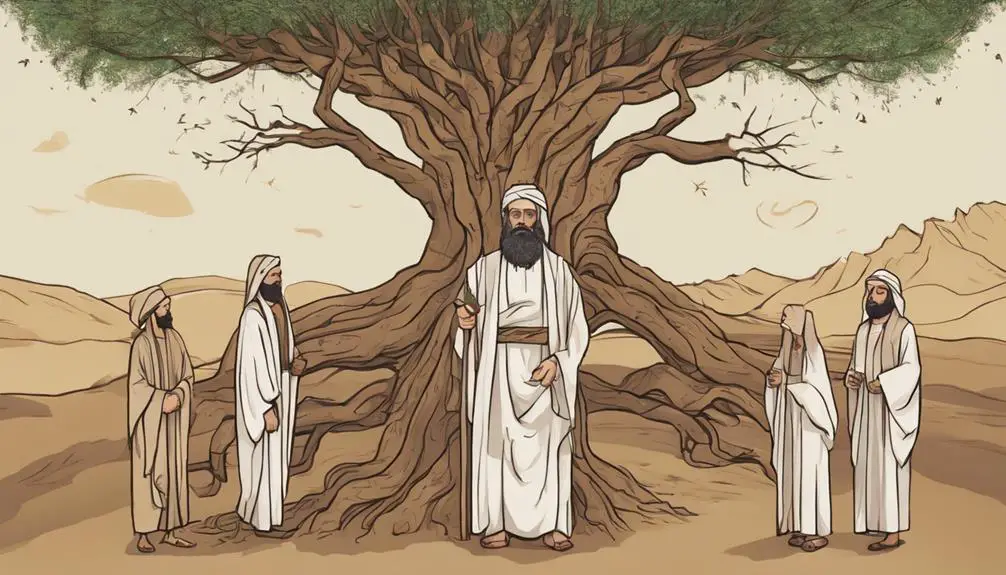
In the lineage of Abraham, there are several noteworthy individuals whose actions and decisions have shaped the biblical narrative in profound ways. You'll encounter characters such as Isaac, Jacob, and Joseph, who were pivotal in the fulfillment of Abraham's promised lineage.
Abraham's wives also had a significant influence, bearing sons who would continue the lineage and shape the future. Sarah bore Isaac, while Hagar was the mother of Ishmael. Keturah, Abraham's third wife, had six sons, including Midian and Zimran.
To provide a clearer depiction, consider the table below:
Individual |
Relation to Abraham |
Significance |
|---|---|---|
Isaac |
Son (Sarah) |
Continuation of promised lineage |
Ishmael |
Son (Hagar) |
Fathered 12 princes, creating a great nation |
Jacob |
Grandson (Isaac) |
Father of 12 sons, forming the 12 tribes of Israel |
Joseph |
Great-grandson (Jacob) |
Saved Israel during famine |
Midian |
Son (Keturah) |
Fathered the Midianites |
Each figure played a role in fulfilling God's promise to Abraham. Their stories, filled with trials, triumphs, and faith, provide a rich testament to the influence and significance of Abraham's lineage in biblical history.
Influence of Abraham's Descendants
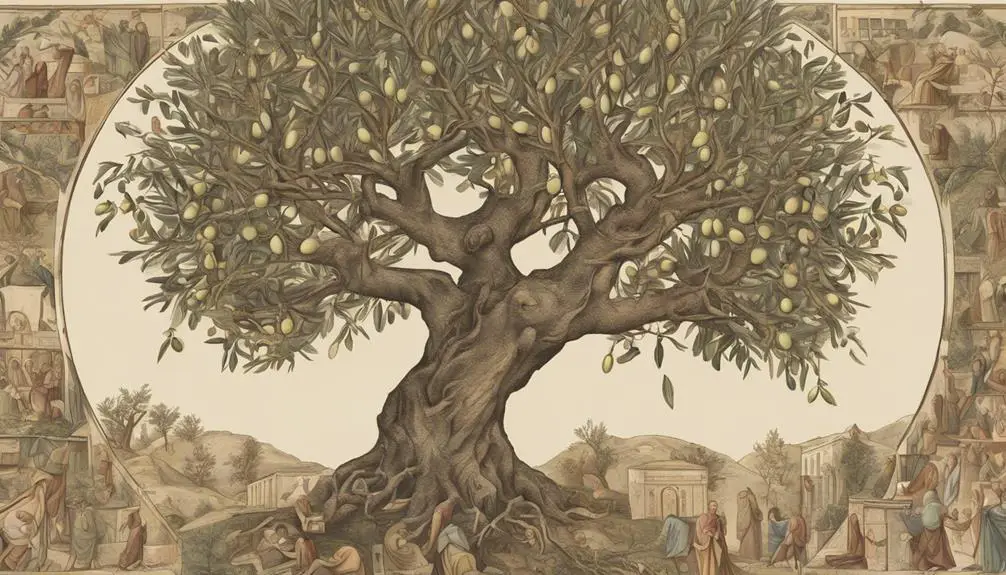
Abraham's descendants, each making significant contributions to their era, left an indelible mark on both the biblical narrative and the development of several ancient civilizations. Notably, Abraham's diplomatic impact, shaped through his strategic alliances and peace treaties, became a blueprint for future generations. You can see this legacy in the stories of Isaac and Jacob, who navigated tense relationships with neighboring tribes and leaders, often choosing diplomacy over conflict.
The cultural contributions of Abraham's descendants, too, can't be overstated. They played pivotal roles in establishing, preserving, and transmitting the cultural and religious traditions that have defined the Jewish, Christian, and Islamic faiths. From the patriarch Isaac to the lawgiver Moses, each figure uniquely contributed to the religious and ethical framework that continues to influence societies today.
In essence, Abraham's descendants weren't mere footnotes in history. They were architects of civilizations, pioneers of diplomacy, and custodians of cultural heritage. Their influence reached far beyond their immediate surroundings, shaping the course of human history. As you delve deeper into their narratives, you'll uncover a rich tapestry of stories that reveal the profound impact of Abraham's lineage.
Tracing Abraham's Legacy

To fully grasp the magnitude of Abraham's legacy, you'll often find yourself tracing the genealogical roots that span centuries, discovering how his lineage influenced and shaped the course of history. Abraham's wives, Sarah and Hagar, played pivotal roles in forming this legacy.
Sarah, Abraham's first wife, bore Isaac, who continued the lineage of Covenant promises. Hagar, his second wife, gave birth to Ishmael, who also left a significant mark.
This table below gives a glimpse into the impact of Abraham's lineage:
Wife |
Impact |
|---|---|
Sarah |
Bore Isaac, through whom Covenant promises continued |
Hagar |
Mother to Ishmael, founder of a great nation |
In tracing Abraham's legacy, you'll find that his descendants formed nations and kings, fulfilling God's promise. Abraham's lineage is more than a mere list of names; it's a testament to God's faithfulness and Abraham's obedience. The legacy left by Abraham is far-reaching, its effects seen in the present day. It is through this lens that Abraham's life and legacy stand as a beacon of faith and obedience, leaving an indelible mark on the annals of history.
Frequently Asked Questions
What Is the Significance of Abraham in Other Religious Texts Outside the Bible?"
Abraham's prophethood isn't just significant in the Bible. In other religious texts, like the Quran, he's a pivotal figure too. His influence on monotheism is immense; he's often seen as a patriarch and a prophet.
His teachings and actions serve as foundations for many religious beliefs and practices. So, understanding Abraham's role outside the Bible can broaden your perspective on his overall impact on monotheism.
Are There Any Archaeological Findings That Support the Biblical Account of Abraham's Lineage?"
You're asking about archaeological evidence supporting Abraham's lineage, specifically his travels and progeny blessings. While there's no direct evidence, some archaeological findings indirectly correlate with biblical accounts, such as ancient city ruins and artifacts. However, these don't confirm Abraham's specific journey or descendants.
Historically, archaeological evidence isn't always available for every biblical event. So, it's important to approach this topic with an understanding of the limitations of archaeological research.
How Has the Interpretation of Abraham's Genealogy Evolved Over Time Among Different Religious Sects?"
You've asked about the evolution of interpreting Abraham's genealogy among various religious sects. It's been an intricate process. Discrepancies in genealogical records have led to diverse interpretations.
While some sects strictly adhere to the belief of Abraham's descendants as stated in the Bible, others have adapted their beliefs to accommodate archaeological findings and historical contexts. This has resulted in a fascinating spectrum of beliefs on this ancestral subject.
What Are Some of the Ethical Implications or Lessons Drawn From the Life and Lineage of Abraham?"
You can draw ethical lessons from Abraham's sacrifices and covenant promises. His willingness to sacrifice his son Isaac underscores the value of faith and obedience.
Additionally, the covenant promises highlight the importance of trust in divine providence. These themes encourage you to act faithfully, obey moral laws, and trust in the goodness of life's outcomes, even when they're uncertain or challenging.
How Has Abraham's Genealogy Influenced Modern-Day Culture and Society?"
Abraham's genealogy has significantly shaped modern-day culture and society, particularly through Abrahamic traditions.
You see its genealogical impact in the religious practices, moral values, and societal structures of Judaism, Christianity, and Islam.
It's influenced legal systems, ethical norms, and even familial relationships.
Conclusion
You've traced Abraham's lineage, examined his immediate descendants, and identified pivotal figures in his line.
You've seen the far-reaching impact of his descendants, and followed the enduring legacy of Abraham.
This genealogical journey illustrated the profound influence of one man's lineage, highlighting the interconnectedness of humanity and the lasting imprint of Abraham's line on history.
Yet, the story of Abraham's descendants continues, ever-evolving and shaping our world.


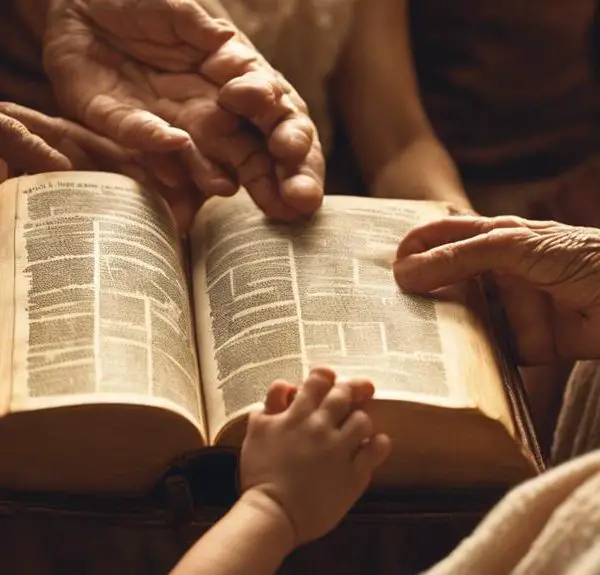
Sign up